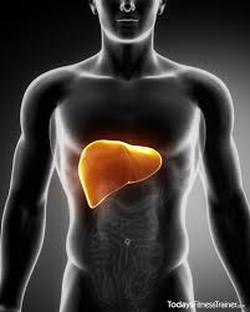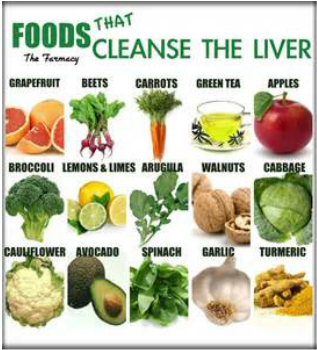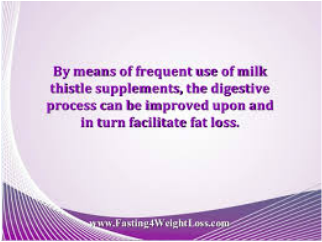
Liver Function and Fat Loss
The liver is your body's hardest working organ which has many functions to ensure your survival. It filters and neutralizes everything that goes into your body. Everything we eat, drink, inhale or absorb through our skin.
The liver is also responsible for the secretion of bile, a fluid stored in the gallbladder which is released to help with digestion.
Bile helps our bodies break down and digest fats. Bile also has other functions like the absorption of calcium and certain vitamins.
The liver sends toxins into the bile so that they can be eliminated from the body. If your liver becomes overloaded then so does the amount of toxins that the liver sends to the bile. If our bile becomes so clogged it cannot function properly, it becomes inefficient in breaking down fats - the outcome is weight gain.
Another liver task is to regulate your body's hormone and metabolic rate which are also linked to weight gain or loss. Your metabolic rate is regulated by the hormones from the thyroid gland. If the liver is sluggish and overloaded the chances are your metabolism will also be sluggish. When your metabolism is running at peak performance your body "knows" what weight it should be. If your liver is not working effectively achieving a healthy body weight will be very difficult.
Signs of a compromised live include muscle and joint pain, sluggishness, headaches, hormonal imbalances, allergies, skin disorders constipation and many other physical ailments. Because an overworked liver does not efficiently remove poisons from the blood, these toxins tend to escape through the skin which result in rashes, itches and acne. Also, being an important part of the body's immune system, when the liver becomes sluggish you can experience a higher incidence of flues and colds and minor illnesses.
The liver is your body's hardest working organ which has many functions to ensure your survival. It filters and neutralizes everything that goes into your body. Everything we eat, drink, inhale or absorb through our skin.
The liver is also responsible for the secretion of bile, a fluid stored in the gallbladder which is released to help with digestion.
Bile helps our bodies break down and digest fats. Bile also has other functions like the absorption of calcium and certain vitamins.
The liver sends toxins into the bile so that they can be eliminated from the body. If your liver becomes overloaded then so does the amount of toxins that the liver sends to the bile. If our bile becomes so clogged it cannot function properly, it becomes inefficient in breaking down fats - the outcome is weight gain.
Another liver task is to regulate your body's hormone and metabolic rate which are also linked to weight gain or loss. Your metabolic rate is regulated by the hormones from the thyroid gland. If the liver is sluggish and overloaded the chances are your metabolism will also be sluggish. When your metabolism is running at peak performance your body "knows" what weight it should be. If your liver is not working effectively achieving a healthy body weight will be very difficult.
Signs of a compromised live include muscle and joint pain, sluggishness, headaches, hormonal imbalances, allergies, skin disorders constipation and many other physical ailments. Because an overworked liver does not efficiently remove poisons from the blood, these toxins tend to escape through the skin which result in rashes, itches and acne. Also, being an important part of the body's immune system, when the liver becomes sluggish you can experience a higher incidence of flues and colds and minor illnesses.

So how can I help my Liver?
Try to incorporate more healthy food choices, especially liver loving foods. Soups are a great way to lose weight and ease your liver; also try eating or drinking, through juicing, more fruits and vegetables in a raw form.
To keep your liver function optimum, try to reduce or avoid a diet that is low in protein and high in carbohydrates and fats. Watch the amount of fried foods, saturated fats, alcohol, processed foods, white flour products and white sugar products.
Try to incorporate more healthy food choices, especially liver loving foods. Soups are a great way to lose weight and ease your liver; also try eating or drinking, through juicing, more fruits and vegetables in a raw form.
To keep your liver function optimum, try to reduce or avoid a diet that is low in protein and high in carbohydrates and fats. Watch the amount of fried foods, saturated fats, alcohol, processed foods, white flour products and white sugar products.

Consider taking Milk Thistle Supplements.
For over 2000 years Europeans have used Milk Thistle seeds as a herbal treatment for liver disorders. Literally hundreds of research studies have confirmed the remarkable ability of Milk Thistle to protect the liver against virtually all types of damage: from toxic side effects of medications, and overindulgence in rich foods or alcohol.
Milk Thistle is not a recipe to continue overindulgence but it will certainly help put your liver back on track.
..see Liver problems Supplements
For over 2000 years Europeans have used Milk Thistle seeds as a herbal treatment for liver disorders. Literally hundreds of research studies have confirmed the remarkable ability of Milk Thistle to protect the liver against virtually all types of damage: from toxic side effects of medications, and overindulgence in rich foods or alcohol.
Milk Thistle is not a recipe to continue overindulgence but it will certainly help put your liver back on track.
..see Liver problems Supplements